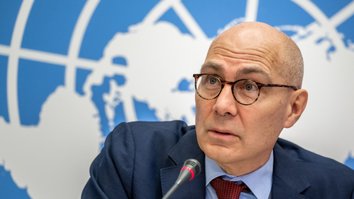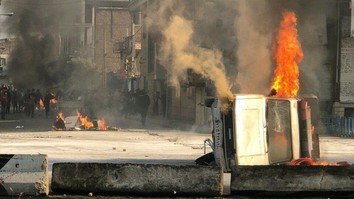GENEVA -- Rising violence as a result of the Taliban's siege of Afghan cities is having "disastrous consequences" for civilians and may amount to war crimes, United Nations High Commissioner for Human Rights (HCHR) Michelle Bachelet warned Tuesday (August 10).
Over the past month, hundreds of civilians have been killed and injured as a result of the Taliban's offensive across Afghanistan.
The capital of Farah province fell Tuesday.
"Since 9 July in four cities alone -- Lashkargah, Kandahar, Herat and Kunduz -- at least 183 civilians have been killed and 1,181 injured, including children," Bachelet said in a statement.
![US special envoy for Afghanistan Zalmay Khalilzad (left), Qatari envoy on counter-terrorism Mutlaq al-Qahtani, and the UN secretary-general's personal envoy on Afghanistan, Jean Arnault, August 10 walk down a hotel lobby in Doha, Qatar, during an international meeting on the escalating conflict in Afghanistan. [Karim Jaafar/AFP]](/cnmi_st/images/2021/08/10/31135-doha-meeting-585_329.jpg)
US special envoy for Afghanistan Zalmay Khalilzad (left), Qatari envoy on counter-terrorism Mutlaq al-Qahtani, and the UN secretary-general's personal envoy on Afghanistan, Jean Arnault, August 10 walk down a hotel lobby in Doha, Qatar, during an international meeting on the escalating conflict in Afghanistan. [Karim Jaafar/AFP]
"These are just the civilian casualties we have managed to document -- the real figures will be much higher," she said.
"The Taliban must cease their military operations in cities," she said, noting that urban warfare results in scores of civilian casualties.
"Unless all parties return to the negotiating table and reach a peaceful settlement, the already atrocious situation for so many Afghans will become much worse," Bachelet said.
'Fear and dread'
The situation in Lashkargah, capital of Helmand province, demonstrates the devastating impact the Taliban's offensive is having on civilians.
"In only 13 days since 28 July, when fighting started in the city, the UN received reports of at least 139 civilians killed and 481 injured," according to the Office of the HCHR (OHCHR).
"The real numbers are expected to be much higher as communication with the city is intermittently cut off and many civilians wounded by the fighting are unable to reach hospitals."
By last Thursday, the hospitals in the city were at near capacity, the OHCHR reported. Food and medical supplies are dwindling, while electricity and water are cut off in most parts of the city.
"In addition, since the start of the May Taliban offensive, at least 241,000 people have been displaced, and the protracted fighting in the cities has resulted in damage to essential infrastructure like roads and bridges, and other civilian objects," the OHCHR said.
The Taliban's sweeping takeover of cities and districts has "struck fear and dread into the population", Bachelet said.
In areas under Taliban control and contested areas, the OHCHR has received reports of "summary executions, attacks against current and former government officials and their family members, military use and destruction of homes, schools and clinics, and the laying of large numbers of improvised explosive devices (IEDs)."
The office also received "deeply disturbing" reports of killings by the Taliban of off-duty Afghan security force members, even those who had surrendered.
"Directing attacks against civilians is a serious violation of international humanitarian law and amounts to a war crime," the OHCHR statement said. "Perpetrators of serious violations of international human rights and humanitarian law must be held accountable."
"The people of Afghanistan are speaking of their deep fears of a return to the worst of the human rights violations of the past," Bachelet said.
"Women, minorities, human rights defenders, journalists as well as others who are particularly vulnerable need particular protection," she stressed. "There are very real risks of renewed atrocities against ethnic and religious minorities."
"People rightly fear that a seizure of power by the Taliban will erase the human rights gains of the past two decades," she said.
Pressing the Taliban to stop
Bachelet urged all states to use their influence to end the hostilities.
"States have a duty to use any leverage they have to de-escalate the situation and reinvigorate peace processes. The fighting must be brought to an end," she said, noting peace-related meetings taking place this week in Doha.
US Special Representative for Afghanistan Reconciliation Ambassador Zalmay Khalilzad is planning to attend the meeting and "will press the Taliban to stop their military offensive", the US State Department said in a statement Monday.
At the talks, Khalilzad will "help formulate a joint international response to the rapidly deteriorating situation in Afghanistan", it said.
"The increased tempo of Taliban military engagement, resulting civilian casualties in armed conflict between the sides and alleged human rights atrocities are of grave concern," the statement said.
"A negotiated peace is the only path to ending the war."

![Internally displaced Afghan families, who fled fighting in Kunduz and Takhar provinces between Taliban and Afghan security forces, sit in Shahr-e-Naw Park in Kabul on August 10. [Wakil Kohsar/AFP]](/cnmi_st/images/2021/08/10/31134-af-human-rights-585_329.jpg)







It is really ridiculous when they say this act of Taliban and that act of Taliban may amount to war crimes. Either you guys are stupid or you think of us as idiots. These acts of the Taliban are without doubt war crimes, what do you mean by ‘may amount to war crimes?’ The Taliban are barbaric and those who are silent over Taliban and Pakistan’s crimes are also bloodthirsty and barbaric. The Taliban office in Qatar should be closed.
Reply2 Comment
There is news of seizing Faizabad, the provincial capital of Badakhshan, and Pol-e-Khomri, the provincial capital of Baghlan, by Taliban. Considering this and looking at the map of Afghanistan, in the north, Badakhshan, Takhar, Kunduz, Baghlan, and Sar-e-Pol, and besides that, Samangan provinces are also fallen to Taliban. On the other side, in the South West, Farah province has fallen to the Taliban's hand. Farah has a border with Iran, and Iran, the second biggest supporter of terrorists after Pakistan, can easily deliver arms and ammunition to the Taliban. This fact increases the possibility that the country's north can entirely fall if action is not taken on time. Whoever takes authority in Afghanistan is not important because the current government is only a company of thieves, corrupt leaders, and looters, and Taliban are puppets of the neighboring countries, especially of Pakistan and Iran; however, what is important is the situation of the civilians as tens of thousands of families have got displaced, people are killed and injured, and now they live a terrible life. May Allah bless our people. Amen.
Reply2 Comment